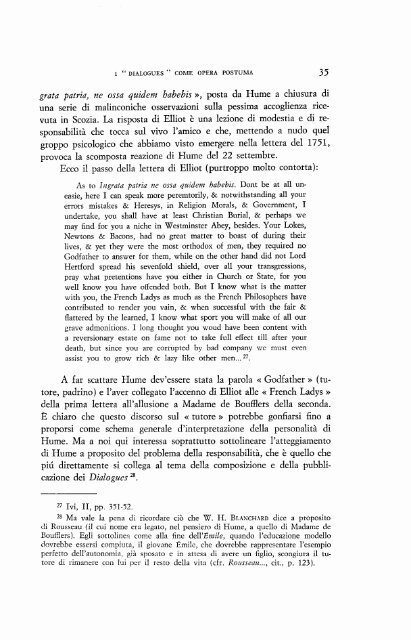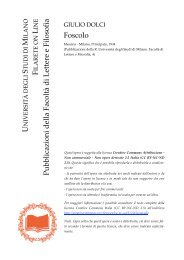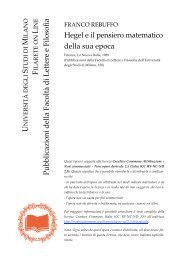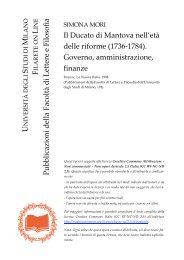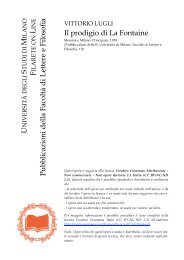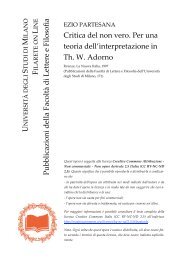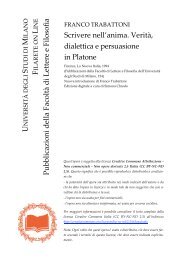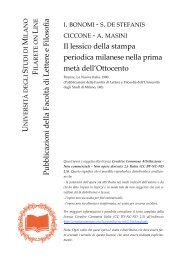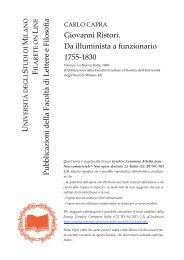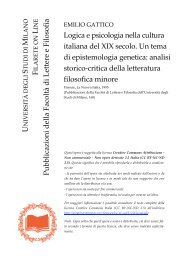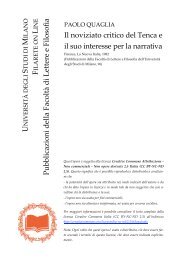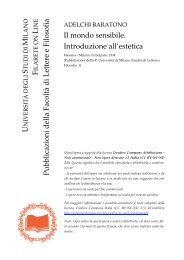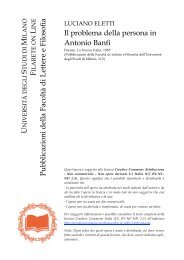Dialoghi sulla religione naturale - Studi umanistici Unimi - Università ...
Dialoghi sulla religione naturale - Studi umanistici Unimi - Università ...
Dialoghi sulla religione naturale - Studi umanistici Unimi - Università ...
You also want an ePaper? Increase the reach of your titles
YUMPU automatically turns print PDFs into web optimized ePapers that Google loves.
I " DIALOGUES " COME OPERA POSTUMA 35<br />
grata patria, ne ossa quidem habebis », posta da Hume a chiusura di<br />
una serie di malinconiche osservazioni <strong>sulla</strong> pessima accoglienza rice<br />
vuta in Scozia. La risposta di Elliot è una lezione di modestia e di re<br />
sponsabilità che tocca sul vivo l'amico e che, mettendo a nudo quel<br />
groppo psicologico che abbiamo visto emergere nella lettera del 1751,<br />
provoca la scomposta reazione di Hume del 22 settembre.<br />
Ecco il passo della lettera di Elliot (purtroppo molto contorta):<br />
As to Ingrata patria ne ossa quidem habebis. Dont be at ali un-<br />
easie, here I can speak more peremtorily, & notwithstanding ali your<br />
errors mistakes & Heresys, in Religion Morals, & Government, I<br />
undertake, you shall bave at least Christian Burial, & perhaps we<br />
may find for you a niche in Westminster Abey, besides. Your Lokes,<br />
Newtons & Bacons, had no great matter to boast of during their<br />
lives, & yet they were thè most orthodox o£ men, they required no<br />
Godfather to answer for them, while on thè other hand did not Lord<br />
Hertford spread his sevenfold shield, over ali your transgressions,<br />
pray what pretentions bave you either in Church or State, for you<br />
well know you bave offended both. But I know what is thè matter<br />
with you, thè French Ladys as much as thè French Philosophers bave<br />
contributed to render you vain, & when successful with thè fair &<br />
flattered by thè learned, I know what sport you will make of ali our<br />
grave admonitions. I long thought you woud bave been content with<br />
a reversionary estate on fame not to take full effect till after your<br />
death, but since you are corrupted by bad company we must even<br />
assist you to grow rich & lazy like other men... 27 .<br />
A far scattare Hume dev'essere stata la parola « Godfather » (tu<br />
tore, padrino) e l'aver collegato l'accenno di Elliot alle « French Ladys »<br />
della prima lettera all'allusione a Madame de Boufflers della seconda.<br />
È chiaro che questo discorso sul « tutore » potrebbe gonfiarsi fino a<br />
proporsi come schema generale d'interpretazione della personalità di<br />
Hume. Ma a noi qui interessa soprattutto sottolineare l'atteggiamento<br />
di Hume a proposito del problema della responsabilità, che è quello che<br />
più direttamente si collega al tema della composizione e della pubbli<br />
cazione dei Dialogues 2S .<br />
27 Ivi, II, pp. 351-52.<br />
28 Ma vale la pena di ricordare ciò che W. H. BLANCHARD dice a proposito<br />
di Rousseau (il cui nome era legato, nel pensiero di Hume, a quello di Madame de<br />
BoufSers). Egli sottolinea, come alla fine dell'Émile, quando l'educazione modello<br />
dovrebbe essersi compiuta, il giovane Émile, che dovrebbe rappresentare l'esempio<br />
perfetto dell'autonomia, già sposato e in attesa di avere un figlio, scongiura il tu<br />
tore di rimanere con lui per il resto della vita (cfr. Rousseau..., cit., p. 123).


